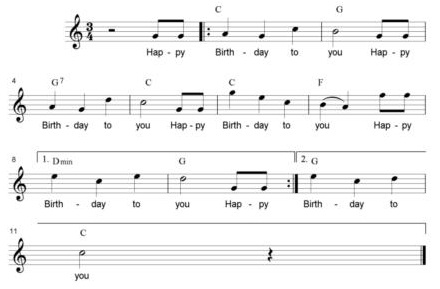
Death of the Author: Copyright and the Public Domain
By Nicole Prieto
The law favors protecting the rights of real property owners, but it also favors limiting someone’s control over property after death, i.e., “deadhand control.” [1] But what about intellectual property? What ends up happening to something as intangible as an author’s copyright after he or she dies?
In early November, the Association for Childhood Education International (ACEI) filed a claim for the ubiquitous “Happy Birthday to You” song, which in September was found not to have been owned by Warner/Chappelle Music. [2] ACEI is a charity that was founded by one of the song’s authors, Patty Hill. [3] Prior to ACEI’s claim but after the September decision, the thought was that the song had entered the public domain. [4]
Anyone can use and appropriate works in the public domain “without liability for infringement.” [5] Such works include those created prior to 1923. [6] This could be a fairly bright-line rule for a song such as “Happy Birthday,” whose lyrics were possibly written in the late nineteenth century. [7]
The actual extant rights over the song, however, are far less clear. While under the impression it had the rights to “Happy Birthday,” Warner collected royalties from its use, a third of which had gone to ACEI. [8] The September decision held that a different entity, the Clayton F. Summy Company, had a right to the song’s melody—just not to its lyrics. [9] Copyright operates like personal property, [10] and the song’s authors, Patty and Mildred Hill, had apparently given the melody rights to Summy Co.
But assuming the rights to the lyrics had never been transferred, it is possible the copyrights remained with the last living Hill sister. [11] Mildred died in 1916, and Patty died in 1946. Their rights would have then descended to their other sister, Jessica, from whom ACEI had apparently later received the rights. [12]
With respect to something as brief, well-known, and indiscriminately sung as “Happy Birthday to You,” it is perhaps surprising that so much has been made of a song now over a century old. It prompts the question of whether, as many had assumed after the September decision, the song just ought to be given public domain status.
According to the U.S. Copyright Office, “[A] work is under copyright protection the moment it is created and fixed in a tangible form that is perceptible either directly or with the aid of a machine or device.” [13] An author’s work created today would remain protected throughout his or her life and usually 70 years after he or she died. [14] Works made by corporations last either “95 years from publication or 120 years from creation, whichever expires first.” [15]
Authors, of course, do not need to wait several decades after they have died to have their works enter the public domain. Authors can declare them to be in the public domain, or they can invoke creative commons licenses that let others use their works within certain parameters (e.g., not using a work for commercial purposes). [16]
In property law, the interests of the living tend to take priority over those of the long-deceased, promoting the alienability of property with principles such as the rule against perpetuities. The statutory expiration of copyrights coupled with public domain status may serve as a similar protection against perpetual “deadhand” IP control.
For a song like “Happy Birthday”—whose authors would have long since passed and whose nigh-genericized cultural ubiquity at least appears to make copyright protection moot—perhaps it is time for its protection to come to an end.
[1] Black’s Law Dictionary (Bryan A. Garner ed., 10th ed. 2014), available at Westlaw.
[2] Bill Donahue, Group Claims It Owns The Rights To ‘Happy Birthday’ Song, Law360 (Nov. 10, 2015), http://www.law360.com/articles/725651/group-claims-it-owns-the-rights-to-happy-birthday-song.
[3] Id.
[4] Id.
[5] Black’s Law Dictionary, supra.
[6] Peter B. Hirtle, Copyright Term and the Public Domain in the United States, Cornell.edu, https://copyright.cornell.edu/resources/publicdomain.cfm (last visited Nov. 29, 2015).
[7] Marya v. Warner/Chappell Music, Inc., No. CV 13-4460-GHK (MRWX) 2015 WL 5568497, at *19 (C.D. Cal. Sept. 22, 2015).
[8] Donahue, supra.
[9] Marya, WL 5568497, at *20.
[10] U.S. Copyright Office, Circular 1 at 6 (2012).
[11] Donahue, supra.
[12] Id.
[13] Library of Congress, Copyright in General, Copyright.gov, http://copyright.gov/help/faq/faq-general.html#what (last visited Nov. 29, 2015).
[14] U.S. Copyright Office, supra, at 5.
[15] Hirtle, supra.
[16] Creative Commons, About The Licenses, CreativeCommons.gov, http://creativecommons.org/licenses/ (last visited Nov. 29, 1015).